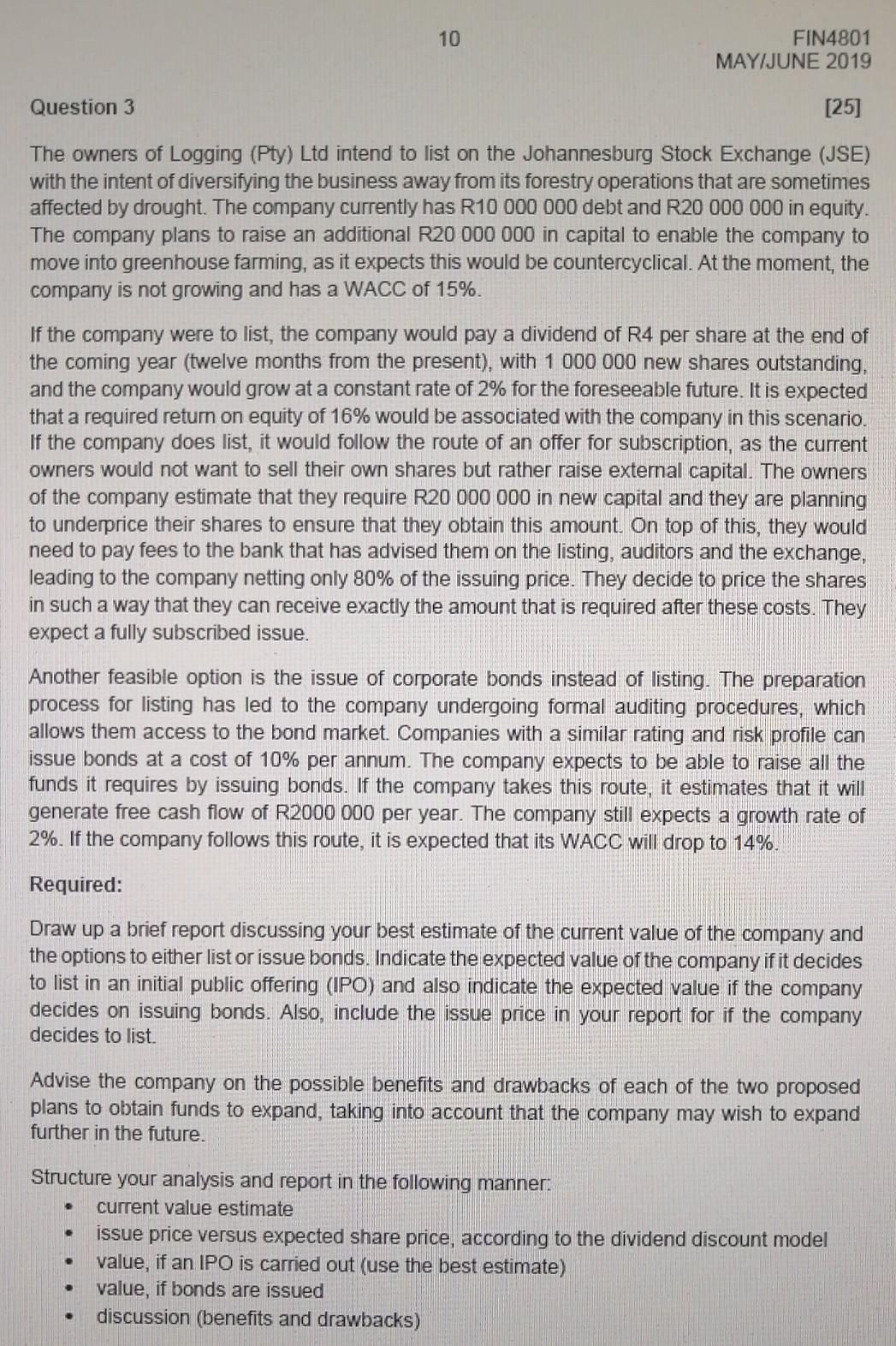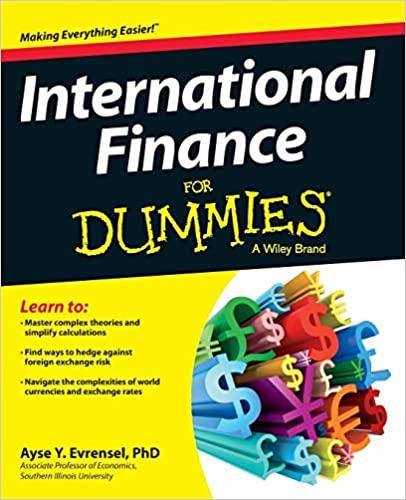Answered step by step
Verified Expert Solution
Question
1 Approved Answer
10 FIN4801 MAY/JUNE 2019 Question 3 [25] The owners of Logging (Pty) Ltd intend to list on the Johannesburg Stock Exchange (JSE) with the intent

10 FIN4801 MAY/JUNE 2019 Question 3 [25] The owners of Logging (Pty) Ltd intend to list on the Johannesburg Stock Exchange (JSE) with the intent of diversifying the business away from its forestry operations that are sometimes affected by drought. The company currently has R10 000 000 debt and R20 000 000 in equity. The company plans to raise an additional R20 000 000 in capital to enable the company to move into greenhouse farming, as it expects this would be countercyclical. At the moment, the company is not growing and has a WACC of 15%. If the company were to list, the company would pay a dividend of R4 per share at the end of the coming year (twelve months from the present), with 1 000 000 new shares outstanding, and the company would grow at a constant rate of 2% for the foreseeable future. It is expected that a required return on equity of 16% would be associated with the company in this scenario. If the company does list, it would follow the route of an offer for subscription, as the current owners would not want to sell their own shares but rather raise external capital. The owners of the company estimate that they require R20 000 000 in new capital and they are planning to underprice their shares to ensure that they obtain this amount. On top of this, they would need to pay fees to the bank that has advised them on the listing, auditors and the exchange, leading to the company netting only 80% of the issuing price. They decide to price the shares in such a way that they can receive exactly the amount that is required after these costs. They expect a fully subscribed issue. Another feasible option is the issue of corporate bonds instead of listing. The preparation process for listing has led to the company undergoing formal auditing procedures, which allows them access to the bond market. Companies with a similar rating and risk profile can issue bonds at a cost of 10% per annum. The company expects to be able to raise all the funds it requires by issuing bonds. If the company takes this route, it estimates that it will generate free cash flow of R2000 000 per year. The company still expects a growth rate of 2%. If the company follows this route, it is expected that its WACC will drop to 14%. Required: Draw up a brief report discussing your best estimate of the current value of the company and the options to either list or issue bonds. Indicate the expected value of the company if it decides to list in an initial public offering (IPO) and also indicate the expected value if the company decides on issuing bonds. Also, include the issue price in your report for if the company decides to list. Advise the company on the possible benefits and drawbacks of each of the two proposed plans to obtain funds to expand, taking into account that the company may wish to expand further in the future. Structure your analysis and report in the following manner. current value estimate issue price versus expected share price, according to the dividend discount model value, if an IPO is carried out (use the best estimate) value, if bonds are issued discussion (benefits and drawbacks) . 10 FIN4801 MAY/JUNE 2019 Question 3 [25] The owners of Logging (Pty) Ltd intend to list on the Johannesburg Stock Exchange (JSE) with the intent of diversifying the business away from its forestry operations that are sometimes affected by drought. The company currently has R10 000 000 debt and R20 000 000 in equity. The company plans to raise an additional R20 000 000 in capital to enable the company to move into greenhouse farming, as it expects this would be countercyclical. At the moment, the company is not growing and has a WACC of 15%. If the company were to list, the company would pay a dividend of R4 per share at the end of the coming year (twelve months from the present), with 1 000 000 new shares outstanding, and the company would grow at a constant rate of 2% for the foreseeable future. It is expected that a required return on equity of 16% would be associated with the company in this scenario. If the company does list, it would follow the route of an offer for subscription, as the current owners would not want to sell their own shares but rather raise external capital. The owners of the company estimate that they require R20 000 000 in new capital and they are planning to underprice their shares to ensure that they obtain this amount. On top of this, they would need to pay fees to the bank that has advised them on the listing, auditors and the exchange, leading to the company netting only 80% of the issuing price. They decide to price the shares in such a way that they can receive exactly the amount that is required after these costs. They expect a fully subscribed issue. Another feasible option is the issue of corporate bonds instead of listing. The preparation process for listing has led to the company undergoing formal auditing procedures, which allows them access to the bond market. Companies with a similar rating and risk profile can issue bonds at a cost of 10% per annum. The company expects to be able to raise all the funds it requires by issuing bonds. If the company takes this route, it estimates that it will generate free cash flow of R2000 000 per year. The company still expects a growth rate of 2%. If the company follows this route, it is expected that its WACC will drop to 14%. Required: Draw up a brief report discussing your best estimate of the current value of the company and the options to either list or issue bonds. Indicate the expected value of the company if it decides to list in an initial public offering (IPO) and also indicate the expected value if the company decides on issuing bonds. Also, include the issue price in your report for if the company decides to list. Advise the company on the possible benefits and drawbacks of each of the two proposed plans to obtain funds to expand, taking into account that the company may wish to expand further in the future. Structure your analysis and report in the following manner. current value estimate issue price versus expected share price, according to the dividend discount model value, if an IPO is carried out (use the best estimate) value, if bonds are issued discussion (benefits and drawbacks)
Step by Step Solution
There are 3 Steps involved in it
Step: 1

Get Instant Access to Expert-Tailored Solutions
See step-by-step solutions with expert insights and AI powered tools for academic success
Step: 2

Step: 3

Ace Your Homework with AI
Get the answers you need in no time with our AI-driven, step-by-step assistance
Get Started


